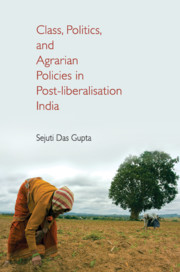Book contents
- Frontmatter
- Dedication
- Contents
- List of Tables and Figures
- List of Abbreviations
- Acknowledgements
- Miscellaneous Frontmatter
- 1 Introduction
- 2 Policy-making, Class Factor, and Political Settlement: Setting the Theoretical Framework
- 3 Privatising the Inputs of Production: A Case of Careful Choice of Beneficiaries and Losers
- 4 Chhattisgarh: New State, New Opportunities for Old Class Domination
- 5 Gujarat: Strong State-directed Capitalism Across Sectors
- 6 Karnataka: State Patronage, Market Opportunism, and Urban–rural Closing Gap
- 7 State in Action, Political Settlement, and the Agrarian Flux
- Bibliography
- Index
6 - Karnataka: State Patronage, Market Opportunism, and Urban–rural Closing Gap
Published online by Cambridge University Press: 16 March 2019
- Frontmatter
- Dedication
- Contents
- List of Tables and Figures
- List of Abbreviations
- Acknowledgements
- Miscellaneous Frontmatter
- 1 Introduction
- 2 Policy-making, Class Factor, and Political Settlement: Setting the Theoretical Framework
- 3 Privatising the Inputs of Production: A Case of Careful Choice of Beneficiaries and Losers
- 4 Chhattisgarh: New State, New Opportunities for Old Class Domination
- 5 Gujarat: Strong State-directed Capitalism Across Sectors
- 6 Karnataka: State Patronage, Market Opportunism, and Urban–rural Closing Gap
- 7 State in Action, Political Settlement, and the Agrarian Flux
- Bibliography
- Index
Summary
This chapter aims to analyse Karnataka's political economy in the post-liberalisation phase. It explores the changes in the economy, particularly in the agricultural sector, and the way these have affected class formation and consolidation. It will examine the relationship between proprietary classes and the state to understand how the state allocates resources, such as land, water, and credit, and infer how the political settlement operates within the state. These questions have been addressed through a thorough literature review and fieldwork conducted in the state between February and July 2012. Although Karnataka has four agricultural universities that publish vast literature, these were of little pertinence for the study. This was primarily due to the technical nature, micro-view, and quantitative approach of these publications. Nonetheless, the information has been included, whenever appropriate. Karnataka is a diverse state, and patterns vary between the northern and southern districts; therefore, evidence from fieldwork is juxtaposed with existing literature to present a comprehensive and nuanced picture. North is less irrigated, has less capitalist agriculture, and has less commercial crops in comparison to south.
In line with the other field-based chapters, this chapter opens with a brief description of the state, and a discussion on the economy particularly sector growth rates, main sources of investment, and alignment of lobbies. It presents the trajectory of certain agrarian proprietary classes and links it to dominant castes, as the literature is mostly written along the parameter of caste. To make sense of proprietary classes after 1991, the scene prior, the 1970s and 1980s has been briefly discussed. This is followed by a brief discussion on three key features of Karnataka – corruption, farmer suicide, and decentralisation. These are relevant for explaining the field findings. Subsequently, political settlement and agrarian class formation and consolidation are reflected upon. Accumulation through diversification by fractions of rich farmers are highlighted along with that of the political leaders and state officials who have transformed into petty bourgeoisie. Field findings suggested that regional variations within the state are brought out. Comparative assessment of these findings with the other two states is attempted. Finally, the nature of the regional state as clientelist, playing a major role side by side the market, has been argued.
- Type
- Chapter
- Information
- Publisher: Cambridge University PressPrint publication year: 2019



